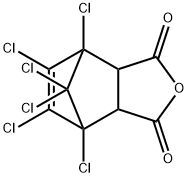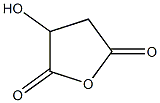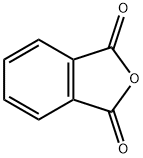Chlorendic anhydride
Synonym(s):Chlorendic anhydride
- CAS NO.:115-27-5
- Empirical Formula: C9H2Cl6O3
- Molecular Weight: 370.83
- MDL number: MFCD00080438
- EINECS: 204-077-3
- SAFETY DATA SHEET (SDS)
- Update Date: 2024-12-18 14:08:52

What is Chlorendic anhydride?
Chemical properties
WHITE CRYSTALLINE POWDER OR CHUNKS
The Uses of Chlorendic anhydride
Chlorendic anhydride is used in the synthesis of polymers, used in production of fiberglass-reinforced resins for chemical industry equipment. It can be used to make alkyd resins for use in special inks and paints. It is used as a hardening agent in epoxy resins used in manufacture of printed circuit boards
The Uses of Chlorendic anhydride
chlorendic anhydride are reactive flame retardant for unsaturated polyester, polyurethane and epoxy resins, are used as epoxy curing agents. The epoxy products resistance is good of the heat distortion temperature about 180 ℃.
The Uses of Chlorendic anhydride
In preparation of polyester resins.
Flammability and Explosibility
Non flammable
Purification Methods
Steam distil the anhydride or recrystallise it from H2O to yield pure diacid. The pure diacid yields the anhydride with Ac2O. [Prill J Am Chem Soc 69 62 1947.]
Properties of Chlorendic anhydride
| Melting point: | 235-239 °C(lit.) |
| Boiling point: | 486.58°C (rough estimate) |
| Density | 1,73 g/cm3 |
| vapor density | 13 (vs air) |
| vapor pressure | 0-0.003Pa at 20-24.85℃ |
| refractive index | 1.5550 (estimate) |
| form | powder to crystal |
| color | White to Almost white |
| Water Solubility | insoluble |
| Sensitive | Moisture Sensitive |
| Merck | 14,2086 |
| BRN | 92693 |
| CAS DataBase Reference | 115-27-5(CAS DataBase Reference) |
| NIST Chemistry Reference | Chlorendic anhydride(115-27-5) |
| EPA Substance Registry System | Chlorendic anhydride (115-27-5) |
Safety information for Chlorendic anhydride
| Signal word | Warning |
| Pictogram(s) |
 Exclamation Mark Irritant GHS07  Health Hazard GHS08 |
| GHS Hazard Statements |
H315:Skin corrosion/irritation H319:Serious eye damage/eye irritation H335:Specific target organ toxicity, single exposure;Respiratory tract irritation H351:Carcinogenicity H373:Specific target organ toxicity, repeated exposure H412:Hazardous to the aquatic environment, long-term hazard |
| Precautionary Statement Codes |
P201:Obtain special instructions before use. P273:Avoid release to the environment. P302+P352:IF ON SKIN: wash with plenty of soap and water. P305+P351+P338:IF IN EYES: Rinse cautiously with water for several minutes. Remove contact lenses, if present and easy to do. Continuerinsing. P308+P313:IF exposed or concerned: Get medical advice/attention. |
Computed Descriptors for Chlorendic anhydride
| InChIKey | FLBJFXNAEMSXGL-UHFFFAOYSA-N |
New Products
(S)-3-Aminobutanenitrile hydrochloride 4-Methylphenylacetic acid N-Boc-D-alaninol N-BOC-D/L-ALANINOL Tert-butyl bis(2-chloroethyl)carbamate 3-Morpholino-1-(4-nitrophenyl)-5,6-dihydropyridin- 2(1H)-one Furan-2,5-Dicarboxylic Acid Tropic acid 1-Bromo-3,5-Di-Tert-Butylbenzene S-2-CHLORO PROPIONIC ACID ETHYL ISOCYANOACETATE 2-Bromo-1,3-Bis(Dimethylamino)Trimethinium Hexafluorophosphate 4-IODO BENZOIC ACID 3-NITRO-2-METHYL ANILINE 1-(2,4-DICHLOROPHENYL) ETHANAMINE (2-Hydroxyphenyl)acetonitrile 4-Bromopyrazole 2-(Cyanocyclohexyl)acetic acid 4-methoxy-3,5-dinitropyridine 1-(4-(aminomethyl)benzyl)urea hydrochloride 2-aminopropyl benzoate hydrochloride diethyl 2-(2-((tertbutoxycarbonyl)amino) ethyl)malonate tert-butyl 4- (ureidomethyl)benzylcarbamate Ethyl-2-chloro((4-methoxyphenyl)hydrazono)acetateRelated products of tetrahydrofuran








You may like
-
 Chlorendic anhydride CAS 115-27-5View Details
Chlorendic anhydride CAS 115-27-5View Details
115-27-5 -
 Chlorendic anhydride 97.00% CAS 115-27-5View Details
Chlorendic anhydride 97.00% CAS 115-27-5View Details
115-27-5 -
 Het Anhydride CAS 115-27-5View Details
Het Anhydride CAS 115-27-5View Details
115-27-5 -
 1,4,5,6,7,7-Hexachloro-5-norbornene-2,3-dicarboxylic anhydride CAS 115-27-5View Details
1,4,5,6,7,7-Hexachloro-5-norbornene-2,3-dicarboxylic anhydride CAS 115-27-5View Details
115-27-5 -
 1975-50-4 98%View Details
1975-50-4 98%View Details
1975-50-4 -
 2-HYDROXY BENZYL ALCOHOL 98%View Details
2-HYDROXY BENZYL ALCOHOL 98%View Details
90-01-7 -
 14714-50-2 (2-Hydroxyphenyl)acetonitrile 98+View Details
14714-50-2 (2-Hydroxyphenyl)acetonitrile 98+View Details
14714-50-2 -
 118753-70-1 98+View Details
118753-70-1 98+View Details
118753-70-1